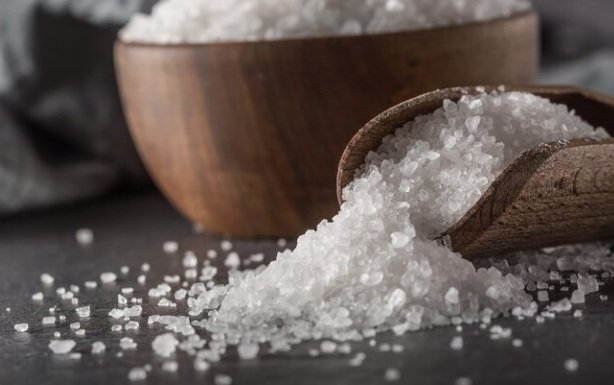Cold sores, also known as fever blisters, can be both painful and unsightly. These viral infections are caused by the herpes simplex virus (HSV) and typically appear as small, fluid-filled blisters on or around the lips.
Many individuals seek quick remedies to alleviate the discomfort and speed up the healing process.
One such home remedy that has gained attention is the use of salt on cold sores overnight. In this in-depth guide, we will explore whether salt on cold sores overnight actually works, how to use it effectively, the risks and benefits associated with this method, alternative home remedies, and when it’s necessary to consult a healthcare professional.
Does Salt on Cold Sores Overnight Work?
The idea behind using salt on cold sores overnight is that salt has antiseptic properties, which can help prevent the infection from spreading and drying out the sore. However, it’s important to note that the effectiveness of this method can vary from person to person, and scientific evidence supporting its efficacy is limited.
Salt can help create an unfavorable environment for the herpes virus by drawing moisture out of the sore. This can potentially reduce the lifespan of the cold sore and relieve some discomfort. However, it’s essential to use salt on cold sores with caution, as it can also cause stinging and irritation.
How to Use Salt on Cold Sores Overnight
If you decide to try salt on cold sores, here is a step-by-step guide on how to do it effectively:
- Gather your supplies: You’ll need table salt (preferably non-iodized) and a clean cotton swab or cotton ball. Make sure your hands are clean before touching the cold sore.
- Clean the area: Gently wash the area around the cold sore with warm water and mild soap. Pat it dry with a clean towel.
- Prepare the salt: Pour a small amount of salt onto a clean plate or dish. Make sure the salt is dry.
- Apply the salt: Dip the cotton swab or ball into the salt, picking up a small amount. Gently press the salted swab onto the cold sore, holding it in place for about 30 seconds. Be careful not to press too hard, as this can cause further irritation.
- Leave it overnight: Ideally, apply the salt before bedtime and leave it on the cold sore overnight. It may sting initially, but the discomfort should subside.
- Rinse in the morning: In the morning, rinse the area gently with warm water to remove the salt residue. Pat it dry with a clean towel.
- Repeat as needed: You can repeat this process once or twice a day as long as it doesn’t cause excessive irritation or discomfort.
It’s crucial to be gentle when applying salt to avoid breaking the blister, as this can lead to infection and prolong the healing process.
The Risks and Benefits of Using Salt on Cold Sores Overnight:
Before using salt as a remedy for cold sores, it’s essential to weigh the potential risks and benefits.
Benefits:
- Possible reduction in healing time: Some individuals report that using salt on cold sores can help dry them out faster and reduce their lifespan.
- Inexpensive and readily available: Salt is a common household item, making it a convenient and affordable option for cold sore treatment.
Risks:
- Pain and irritation: Applying salt to a cold sore can cause stinging and discomfort, especially during the initial application.
- Possible exacerbation: Salt may not be suitable for everyone. Some individuals may experience increased pain, redness, or irritation when using salt, making their cold sores worse.
- Risk of infection: If not used properly, salt can potentially break the cold sore open, leading to bacterial infection and a more extended healing process.
- Not a cure: Salt is not a cure for cold sores. It can only provide temporary relief and may not prevent future outbreaks.
- Individual variability: The effectiveness of salt on cold sores can vary from person to person. What works for one individual may not work for another.
Overall, salt can be considered as an option for cold sore treatment, but it’s not a guaranteed solution. It’s essential to monitor how your skin reacts to salt and discontinue use if it worsens the condition or causes excessive discomfort.
Other Home Remedies for Cold Sores:
If using salt on cold sores doesn’t appeal to you or doesn’t provide the desired relief, there are several other home remedies you can consider:
- Ice: Applying ice to the cold sore can help reduce pain and inflammation. Wrap the ice in a clean cloth and hold it against the sore for a few minutes at a time.
- Lip balms and creams: Over-the-counter lip balms containing ingredients like docosanol or benzyl alcohol may help speed up healing and provide relief.
- Aloe vera gel: The soothing properties of aloe vera can help alleviate pain and promote healing. Apply a small amount of aloe vera gel to the cold sore.
- Lysine supplements: Some people find that taking lysine supplements can help reduce the frequency and severity of cold sore outbreaks.
- Tea tree oil: Diluted tea tree oil applied topically may have antiviral properties and could help with cold sore management.
- Honey: Applying honey to a cold sore may help reduce pain and speed up the healing process due to its natural antibacterial properties.
- Over-the-counter creams: Antiviral creams containing ingredients like acyclovir or penciclovir can help reduce the duration of a cold sore outbreak when used as directed.
It’s important to note that not all remedies work for everyone, and what works for one person may not work for another. Additionally, these remedies are typically most effective when used at the first sign of a cold sore outbreak.
When to See a Doctor for a Cold Sore:
While most cold sores can be managed at home with over-the-counter treatments and home remedies, there are situations where it’s advisable to seek medical attention:
- Frequent or severe outbreaks: If you experience cold sores frequently (more than six times a year) or have particularly severe outbreaks, consult a healthcare professional. They may recommend prescription antiviral medications to manage the condition.
- Eye involvement: If a cold sore affects the eye area or if you experience eye symptoms like redness, pain, or discharge, seek immediate medical attention. Eye involvement can lead to serious complications.
- Weakened immune system: If you have a weakened immune system due to a medical condition or medication, consult your healthcare provider for guidance on managing cold sores.
- Prolonged or worsening symptoms: If your cold sore doesn’t improve within two weeks or if it worsens despite home treatment, see a doctor.
- Signs of infection: If the cold sore becomes infected, you may notice increased redness, swelling, pain, or discharge. In such cases, seek medical attention for appropriate treatment.
- First-time outbreak: If you experience your first cold sore outbreak, it’s a good idea to consult a healthcare professional for a proper diagnosis and guidance on managing the condition.
In conclusion, using salt on a cold sore overnight can be a home remedy worth considering for some individuals. It may help dry out the sore and potentially reduce its lifespan. However, its effectiveness varies, and it can cause initial discomfort and irritation. It’s important to be cautious and discontinue use if it worsens the condition. Additionally, there are alternative home remedies and over-the-counter treatments available, and in certain cases, medical consultation may be necessary for managing cold sores effectively.












